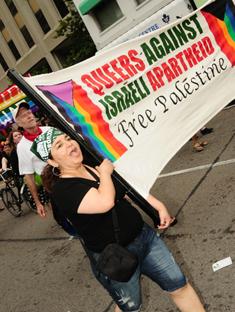With Pride Toronto’s announcement that it will craft a “freedom of expression policy” as a guide to acceptable messages at the parade, executive director Tracy Sandilands insists, “Let’s bring it out and see what people think about it.”
But Pride Toronto is already behind the curve, says David Demchuk, a writer and a member of the rapidly growing Don’t Sanitize Pride Facebook group.
“A freedom of expression policy sounds offensively Orwellian from the start,” says Demchuk.
Pride’s goal may be to see marchers playing well with others, but that’s misguided, he says.
“I think it’s always sweetly amusing when people say ‘protesters should be nicer.’ Well, no,” he says. “Maybe they’re not trying to get you to sympathize — that’s too much work — maybe they’re just trying to get you to be aware.”
An earlier Pride Toronto press release read, “Participating groups will be asked to ensure that messages support the theme of the 2010 festival.” It also read that an “ethics committee” would review signage. Sandilands subsequently wrote on Pride Toronto’s Facebook page, “None of this is anything new.”
In an interview with Xtra on March 16, Sandilands tried to minimize the scope of the change and said a “free expression policy” was under development and would be circulated for community feedback.
“All we are trying to do is make sure we have measures in place to deal with any problems that may arise from violence or hate speech,” she says.
Still, it doesn’t sit well with Demchuk. While Pride as an organization should strive to be politically neutral, he says, its participants shouldn’t be neutered.
“Pride as an event — particularly the Parade — has a tradition of politics and progressivism. You don’t have to support everything in the parade,” he says, “but Pride is elastic enough to withstand most messaging.”
“It’s not inconceivable that we could now have an LGBT pro-life group marching,” he laughs. “Probably only six people, but if they’re brave enough to march with the understanding that it’s a progressive parade, of course they should be allowed to. I don’t care if people are Zionists or Zoroastrians. I only care about freedom of speech.”
Playwright Brad Fraser agrees.
“Censorship coming from the gay community puts us uncomfortably close to our oppressors, and that makes me very nervous,” says Fraser. “The very idea of the march itself is a political one, and if we start censoring messages where do we stop?”
Calling Pride’s new ethics committee “ridiculous and offensive,” novelist Zoe Whittall says she heard similar arguments while living in Montreal.
“Montreal Pride tried to tell people not to wear leather or be slutty, to show the straights that we are normal, and the queer community responded with joyful, naked, in-your-face, slutty chaos,” she says. “I think these kinds of decisions are only going to backfire for the people who make them.”
“Counter-demonstrations seem to work well,” says Fraser, but ultimately, “Pride has to decide for itself whether it’s just a fun event promoted to lure straight people to spending their money in our neighbourhood or if it has something more going on.”
Meanwhile, gallery owner and city council candidate Kristyn Wong-Tam suggests “Pride Toronto convene a community meeting as soon as possible to clarify its position on vetting signage. The meeting should be co-facilitated by two people chosen by the community and Pride Toronto.
“The whole discussion is starting to escalate into a chaotic online shouting match. This will not conclude well for our community,” she says.


 Why you can trust Xtra
Why you can trust Xtra


